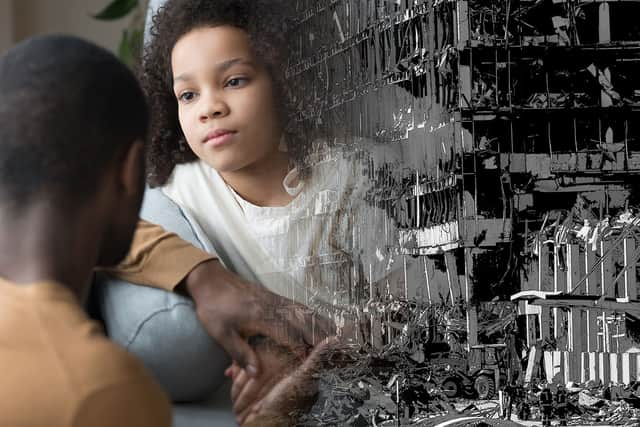How to talk to children about Ukraine war: child psychologist’s advice and tips on speaking about the conflict
This article contains affiliate links. We may earn a small commission on items purchased through this article, but that does not affect our editorial judgement.
and live on Freeview channel 276
Russia’s invasion of Ukraine continues with millions fleeing their homes and seeking safety in other countries.
The war has destroyed homes, torn families apart and left scores of people dead.
Advertisement
Hide AdAdvertisement
Hide AdThere is constant coverage of the conflict on TV, online and social media - which means that it is likely many children will be aware of what is happening in Ukraine.
But how should you talk to children about the war and is there an appropriate age to have that discussion?
We spoke to a child psychologist to find out more about how to talk to children about the war.


How do young children find out about the war?
School-aged children will normally be more aware of current events due to both talk in classrooms and playgrounds and their developing understanding of news reports, said child psychologist Dr Alison McClymont.
Advertisement
Hide AdAdvertisement
Hide AdDr McClymont said children may be able to read news headlines and, for those who have just started to read, it is not unusual that they want to read everything they can.
She added that we “need to be mindful of what ‘reading material’ these children see and attempt to decode”.
Although children may pick up on current news events from seeing it on the news or watching their parents look at updates on their phones, including on social media, Dr McClymont said parents discussing the war is the most likely place they will hear it and interpret it.
Children will gain “the majority of their views on [the war] from their household,” she said.
Advertisement
Hide AdAdvertisement
Hide AdWill children learn about the war in Ukraine in schools?
Primary schools often hold assemblies on current events, which Dr McClymont said is ok to do, but schools “need to be extremely mindful of how they communicate a topic”.
She said that young children may hold strong views, which usually reflects their parents’ opinions, and “they may feel confused by hearing an alternative view at school”.
However, she said this can be managed by offering a non-biased approach to current events, such as sticking to facts rather than debates.
In secondary school, children are far more capable of holding two sides of an argument in their mind and can engage in a debate, Dr McClymont added.
Advertisement
Hide AdAdvertisement
Hide AdShe said: “Secondary school is actually a great time to encourage this and develop students’ own thoughts and ideas around moral issues, outside of the home environment.”
How to speak to a young child about the Ukraine war
For parents wondering if they should broach the topic of the war in Ukraine with their child, Dr McClymont said it is best to initially just respond to questions.
She said she would not raise the topic with a primary school-aged child unless asked by them.
However, Dr McClymont added that parents should not ignore questions.
Advertisement
Hide AdAdvertisement
Hide AdIf asked questions by a child, parents should congratulate them for asking, as “it’s a good thing to be interested in the world around us,” but “try not to overwhelm them with information,” she added.
Although Dr McClymont said she would be mindful of showing children images from the news, it could be useful to have historical discussions around the relationship between Ukraine and Russia, using tools such as maps.
Can seeing harrowing images have an impact on a child’s mental health?
Dr McClymont said: “Definitely. Research shows us that children who are repeatedly exposed to violent imagery before adulthood have a higher chance of suffering from poor empathy, anxiety, and aggressive thoughts or actions.
“There is very little benefit in over exposure to this type of imagery and it should be discouraged at all times.”
Advertisement
Hide AdAdvertisement
Hide AdShe said that research suggests a child being over-exposed to this imagery makes them more fearful of the world around us, as well as being “more desensitised to the pain and suffering of others”.
Dr McClymont also added that if a child is conveying that they’re not ready for topics such as the war in Ukraine to be discussed, or if they already exhibit anxiety, then parents and guardians should instead “attempt to ground the child in safe comforting thoughts about the present and look for things to feel grateful for”.
A message from the editor:
Thank you for reading. NationalWorld is a new national news brand, produced by a team of journalists, editors, video producers and designers who live and work across the UK. Find out more about who’s who in the team, and our editorial values. We want to start a community among our readers, so please follow us on Facebook, Twitter and Instagram, and keep the conversation going. You can also sign up to our email newsletters and get a curated selection of our best reads to your inbox every day.
Comment Guidelines
National World encourages reader discussion on our stories. User feedback, insights and back-and-forth exchanges add a rich layer of context to reporting. Please review our Community Guidelines before commenting.
